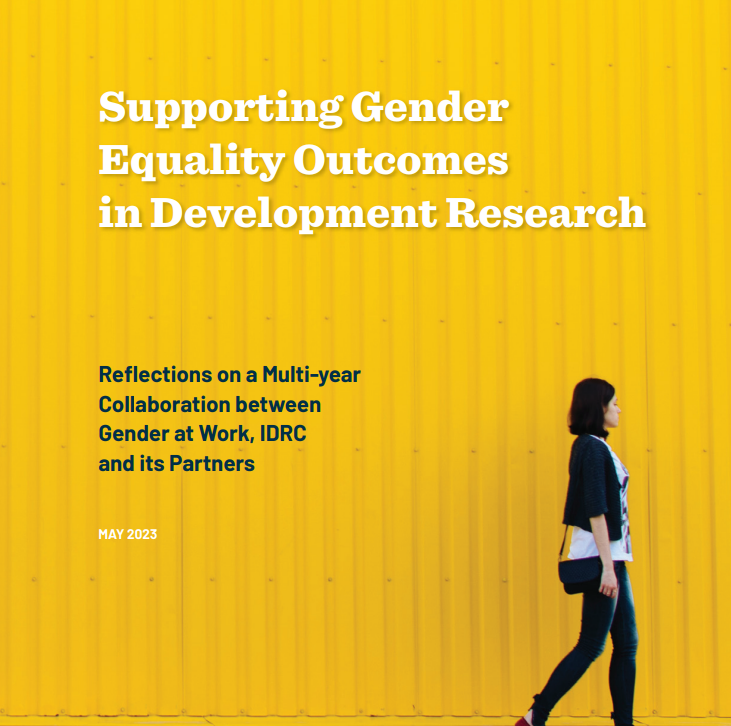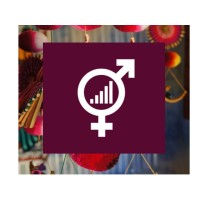Partnering Up to Advance Gender Equality
in Development Research
In November 2015, Rieky Stuart and David Kelleher were asked to meet with Networked Economies (NE), a program at International Development Research Centre (IDRC). NE wanted to improve the capacity of its research partners to deliver gender responsive outcomes. What started as a small exploratory project has since grown into work over seven years and counting, with seven IDRC programs, involving more than twenty-five Gender at Work (G@W) Associates and other consultants.
Gender at Work has collaborated in programs as diverse as artificial intelligence and COVID (#AI4COVID), Global Health, Policy Think Tanks and Food, Environment and Health, Climate Change and Cyber Policy. After six years working to advance gender equality in development research, scores of people and dozens of organizations in more than 15 countries are now doing research differently. Attitudes have changed, new methods have been adopted, new ways of working with grantees have emerged, and new knowledge has been created.
We invite you to navigate around the cluster of documents on this page, which collectively tells this story of change towards gender equitable development research.

SUPPORTING GENDER EQUALITY OUTCOMES IN DEVELOPMENT RESEARCH: REFLECTIONS ON A MULTI-YEAR COLLABORATION BETWEEN GENDER AT WORK, IDRC AND ITS PARTNERS
What does it take to improve gender equality outcomes in development research?
This research monograph presents a process-driven methodology that supports research institutions, and other development institutions, to fill the implementation gaps that are often found between formal gender policies and strategies, and the hoped-for gender equality outcomes. It draws on the experience of five International Development Research Centre research programs Gender at Work worked with between 2016 and 2022. READ IT HERE!
THE THINK TANK INITIATIVE BLOG SERIES
Gender at Work accompanied five policy think tanks from Bangladesh, Nigeria, El Salvador, Guatemala, and Ghana throughout a 16-month online Gender Action Learning program, between 2018 and 2019. The think tanks each committed to a gender-related change project and met periodically online and face-to-face to discuss progress.
The learning was often at an organizational level focused on such things as ensuring that gender was included in all research projects, working with their board of directors, building common understandings about gender in research, developing procedures which allow more women to do field research and analyzing the organization itself with a gender lens. Most of the organizations also learned by actually doing gender-sensitive research in fields such as transport policy and anti-sexual harassment work.
The Think Tank Initiative blog series brings together 14 personal stories from the program’s participants, which emerged during a writing workshop at the end of the 16-month-period, in 2019. Enjoy!
#AI4COVID BLOG SERIES
The Global South AI4COVID Program was designed to support multidisciplinary research to develop and scale responsible (inclusive, rights-based, ethical, and sustainable), evidence-based AI and data science approaches that support COVID-19 response and recovery in low- and middle-income countries.
From January 2021, Gender at Work in partnership with the Ladysmith Collective, provided gender and inclusion support to the Global South AI4COVID program. Our objective was to strengthen AI4COVID partners’ efforts to integrate gender equality and intersectionality (GEI) principles and approaches internally and across the research cycle to enhance gender-responsive outcomes.
Some of the partners opted for mentoring with a G@W consultant, some did not feel the need for help. However, four of the AICOVID partners chose to be part of an online action learning program that met over 18 months. In February 2023, the teams met in Nairobi, Kenya, to consider what they had learned and discuss questions such as: – In order to follow responsible AI, what is wrong or right and at what stage? – What are the principles and practices? – Can we have minimal benchmarks of ethical and fair AI? – To ensure gender equality and inclusion, what data collection methods should we use? – How can we ensure diversity of representation? – How do we get this data?
During this occasion, participants worked with writing coach Ethan Gilsdorf to create blog posts that reflect their experience as they worked on these questions. Click on the button below to read the final outcomes!

LEARNING & TECHNICAL BRIEFS
Beginning with the AI4COVID project and continuing in current ones, G@W has partnered with the Ladysmith Collective, a feminist research consultancy with a particular competence in data science. Over the period of the AI4COVID project, they led the development of the four technical briefs listed below.
- TECHNICAL BRIEF #1: Designing gender-responsive data projects: Synthesis of key frameworks and guidelines. This brief signposts researchers and data producers to established and emerging best practice frameworks for designing gender-responsive data projects. Also available in Spanish and French.
- TECHNICAL BRIEF #2: A guide for more gender-responsive health research. This brief explores the question what is gender-responsive health research, and why does it matter? Also available in Spanish and French.
- TECHNICAL BRIEF #3: Stakeholder engagement for gender-responsive health research. Stakeholder engagement (SE) refers to the involvement of impacted communities and individuals as partners in—rather than merely subjects of—research;in this case, it’s specific to the context of health research. Also available in Spanish and French.
- TECHNICAL BRIEF #4: Connecting Gender Data to Action. Recent international initiatives show an increasing concern with gender data gaps, and—thanks in large part to decades of feminist advocacy—a growing awareness of the significant harm that can be caused by research that excludes women, girls, and other marginalized communities’ experiences. These gaps have become especially evident in the wake of the COVID-19 pandemic. Also available in Spanish and French.
Additionally, you can also find the Learning Brief that summarized the discussion from the final meeting of the COVIDAI action learning teams, in Nairobi, 2023.
- LEARNING BRIEF: What does it take to have gender-resposinve AI-driven health research – Takeaways from the Gender Action Learning Workshop in Nairobi (COVIDSOUTH.AI). The final in-person peer learning event with the AI4COVID cohort was an opportunity to reflect and connect experiences on the intended and unintended outcomes, challenges, and lessons learned from their efforts to meaningfully and intentionally integrate gender equality and inclusion (GEI) into their multi-disciplinary research.
REFLECTIONS ON FACILITATION & PARTICIPATION
Beginning in 2017, Gender at Work worked with Cyber Policy Centres from Asia, Africa and Latin America in a series of workshops and mentoring sessions. As part of considerations of gender equality in cyber policy and research methodologies, some of this work explored the personal dimensions related to working in a more gender responsive way. The two blogs below by Chenai Chair and Mitchel Ondili explore some of this personal learning.
- Letter to my young self, by Chenai Chair
- A calling to do the work, by Mitchel Ondili
Over the years of continued efforts to advance gender equality in development research through partnerships and gender action learning programs, there were many discussions about the quality of facilitation required to support learning and organizational change. Writing was an important part of these discussions, and you can read first-hand four blog posts that compile some of these reflections on facilitation:
- What am I trying to do here? by David Kelleher
- Balancing on the Cusp, by Michal Friedman
- How do I understand Mentoring, by David Kelleher
- Gender Conversations Guide, by Shannon Sutton
A PARTNERSHIP* BETWEEN
* This work was carried out with the aid of a series of grants from the International Development Research Centre, Ottawa, Canada. The views expressed herein do not necessarily represent those of IDRC or its Board of Governors.



